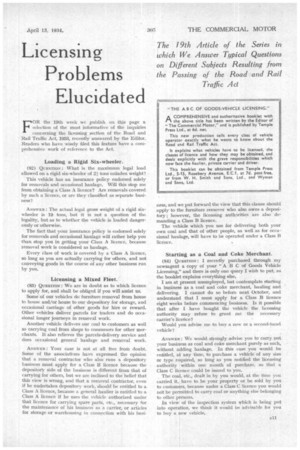Licensing Problems Elucidated
Page 51

If you've noticed an error in this article please click here to report it so we can fix it.
FOR the 19th week . we publish on this page a selection of the most informative of the inquiries concerning the licensing section of the Road and Rail Traffic Art, 1938, recently answered by the Editor. Readers who have wisely filed this feature have a comprehensive work of reference to the Act.
Loading a Rigid Six-wheeler.
(82) QUESTION : What is the maximum legal load allowed on a rigid. six-wheeler of 21. tons unladen weight?
This vehicle has an insurance policy endorsed solely for removals and occasional haulage. Will this stop me from obtaining a Class A licence? Are removals covered by such a licence, or are they classified as separate busi'less ?
ANSWER: The actual legal gross weight of a rigid sixwheeler is 19 tons, but it is not a question of the legality, but as to whether the vehicle is loaded dangerously or otherwise.
The fact that your insurance policy is endorsed solely for removals and occasional haulage will rather help you than stop you in getting your Class A licence, because removal work is considered as haulage.
Every class of work is covered by a -Class A licence, so long as you are actually carrying for others, and not conveying goods in the course of any other business run by you.
Licensing a Mixed Fleet.
(83) QUESTION We are in doubt as to which licence to apply for, and shall be obliged if you will assist us.
Some of our vehicles cke furniture removal from house to house and/or house to our depository for storage, and occasional carriage of other goods for hire or reward. Other vehicles deliver parcels for traders and do occasional longer journeys in removal work.
Another vehicle delivers Our coal to customers as well as carrying coal from shops to consumers for other merchants. It also relieves the parcels-delivery service and does occasional general haulage and removal work.
ANswee Your case is not at all free frone doubt. Some of the associations have expressed. the opinion that a removal contractor who also runs a depository business must apply for a Class B licence because the depository side of the business is different from that of carrying for others, but we are inclined to the belief that this view is wrong, and that a removal contractor, even if he undertakes depository work, should be entitled to a Class A licence, because a general haulier is entitled to a. Class A licence if he uses the vehicle authorized under that licence for carrying spare parts, etc., necessary for the maintenance of his business as A carrier, or articles for storage or warehousing in connection with his busi
ness, and we put forward the view that this clause should apply to the furniture remover who also owns a depository; however, the licensing authorities are also demanding a Class B licence. The vehicle which you use for delivering both your own coal and that of other people, as well as for occasional haulage, will have to be operated under a Class B licence.
Starting as a Coal and Coke Merchant.
(84) QUESTION: I recently purchased through my newsagent a copy of your "A B C of Goods Vehicle Licensing," and there is only one query I wish to put, asthe booklet explains everything else.
I am at present unemployed, but contemplate starting in business as a coal and coke merchant, hauling and delivering. I cannot do so before next October, and understand that I must apply for a Gass B licence eight weeks before commencing beisiness. Is it possible that after I have bought the vehicle the licensing authority may refuse to grant me the necessary carrier's licence?
Would you advise me to buy a new or a second-hand vehicle?
ANSWER We would strongly advise you to carry: out your business as coal and coke merchant purely as such, without adding haulage. In this case you would be entitled, at any time, to purchase a vehicle of any size or type required, so long as you notified the licensing authority within one month of purchase, so that a Class C licence could be issued to you.
The coal, etc., dealt in by you would, at the time you carried it, have to be your property or be sold by you to customers, because under a Class C licence you would not be permitted to carry coal or anything else belonging to other persons.
In view of the inspection system which is being put into operation, we think it would be advisable for you to buy a new vehicle.


























































































